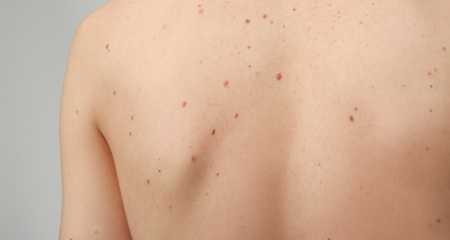
Most people don’t pay attention to their moles unless the spot is on their face or an area that affects their appearance. But it’s important to notice the moles on your body because they can turn into melanoma, the most dangerous type of skin cancer. The board-certified dermatologists at Northstar Dermatology in North Richland Hills TX, perform routine full-body skin exams and evaluate any suspicious-looking moles. If you want a mole removed for cosmetic reasons or you’re concerned about the appearance of a mole, schedule an appointment online or call the office today.
Dermatology is located in North Richland Hills, TX. Also serving other Texas cities: Southlake, Colleyville, Keller, Hurst, Euless, Bedford, and Fort Worth, TX.
Moles are clusters of melanocytes (pigment-producing cells) that appear as growths on the skin. They are very common—most people have moles—and can range in color from natural skin tones to pink, blue, brown, or black. Moles typically start forming in childhood and may grow during adolescence. New moles that appear in adulthood could be a potential sign of melanoma and should be evaluated by a board-certified dermatologist.
Regular skin exams with a board-certified dermatologist can help detect early signs of melanoma. Additionally, performing self-skin checks can aid in spotting warning signs. When examining your moles, look for the following:
If a mole shows any of these characteristics, or if you notice bleeding or discomfort, schedule a skin cancer screening with a specialist at Northstar Dermatology.
If a mole exhibits characteristics of abnormality or potential skin cancer upon examination, a biopsy may be recommended. The area will be numbed, and a thin blade will be used to carefully shave off the surface tissue of the mole, which will then be sent to a pathology lab. A pathologist will examine the tissue’s microscopic features to confirm the diagnosis or assess any abnormalities. If skin cancer is detected, further treatment or excision may be recommended to remove any remaining cancer cells from the base of the lesion. Moles with atypical features may also be recommended for excision to prevent the potential development of melanoma, while others may only require monitoring if mild.
Dermatologists are expertly trained to evaluate mole characteristics and can examine tissue closely using a dermatoscope. For an assessment of any new or changing moles, consult with the board-certified dermatologists at Northstar Dermatology in North Richland Hills.
